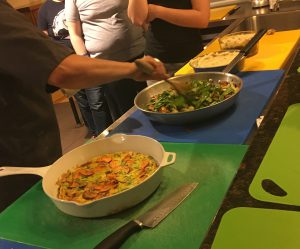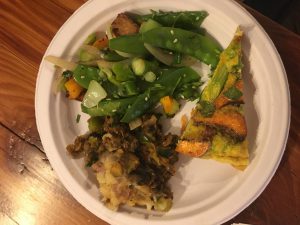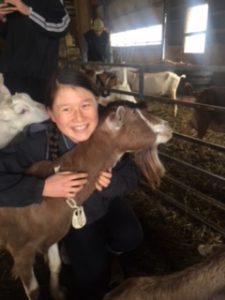 Last Thursday evening, I attended a cooking class at the Poughkeepsie Underwear Factory. The Poughkeepsie Underwear Factory is located in downtown Poughkeepsie, about a 5 minute bus ride from Vassar. The space has been renovated by Hudson River Housing and now serves as a combination of affordable housing, open art studios, and the open kitchen space, which is home to North River Roasters and Earth, Wind, and Fuego.
Last Thursday evening, I attended a cooking class at the Poughkeepsie Underwear Factory. The Poughkeepsie Underwear Factory is located in downtown Poughkeepsie, about a 5 minute bus ride from Vassar. The space has been renovated by Hudson River Housing and now serves as a combination of affordable housing, open art studios, and the open kitchen space, which is home to North River Roasters and Earth, Wind, and Fuego.
Building community is central to the vision of the Poughkeepsie Underwear Factory, and they host various events like the cooking class that I went to. I definitely felt that the class was a community event, with a range of participants, from a local high school student to a Vassar employee. The class was led by Chef Key, who also works with the education program at the Poughkeepsie Farm Project. The title of the class was “A Week in Meals” and the goal was to learn basic skills and prepping techniques for efficient and manageable eating throughout a busy week.

After some brief introductions, Chef Key discussed her cooking philosophy with us. She recognized the reality that cooking can feel like a chore, but encouraged everyone to find ways to feel comfortable and creative about making food. She also touched on concepts like seasonal eating, local eating, and cultural food heritage. Everything she said really resonated with my personal beliefs and experiences with food.
On the menu for the night were three relatively simple, healthy dishes: sweet potato frittata, spring vegetable stir-fry with tofu, and lentil sheperd’s pie. Chef Key went over the basic techniques for cutting different types of vegetables –julienned onions and peppers, bias cut scallions, diced celery. She stressed that vegetable chopping is probably the most labor intensive aspect of cooking, and that taking an hour or two each week to prep all your vegetables for the week, then storing them in containers in the refrigerator, can make weeknight cooking much easier and faster. One new tip I found especially useful was her suggestion to prep and store diced potatoes in water, which can last for 3-4 days. Due to the starch they produce, I always thought you had to prep potatoes right before cooking, so this was a real eye opener!
After her knife-skill demonstrations, Chef Key made sure everybody got a chance to sharpen their own knife skills, and we collectively prepped all the vegetables we would need for our meal. The cooking was pretty simple, which illustrated her point that prep is the bulk of the work. Chef Key also offered a few tips about prepping other ingredients, such as marinating tofu or meat, soaking beans, and roasting vegetables beforehand. At the end of the class, we all got to taste the food we had made, and I think everybody agreed it was delicious!
While not directly related to local agriculture, I think this cooking class highlights a key, yet often overlooked aspect of food systems. The ability to eat locally and support sustainable agriculture is dependent on the ability to properly prepare the food sold by local farms. Cooking is the final piece of the food system-how do we prepare food after we’ve purchased it–and lack of cooking knowledge or skills can serve as a barrier to healthy, local eating. A sustainable agriculture system depends on consumers who can actually use local farm products. I felt that this cooking class directly addressed the issue of cooking as a barrier or agent of accessibility to better eating, and I think work on this end of the food system is important to supporting sustainable local agriculture and making it a feasible option for all. This also relates to food insecurity in Poughkeepsie, and issue that I learned more about when helping with the Poughkeepsie food security a couple of weeks ago. There are definitely a variety of factors contributing to the 25% food insecurity rate in Poughkeepsie, but I think efforts such as the cooking class at Poughkeepsie Underwear Factory can contribute addressing food insecurity.




